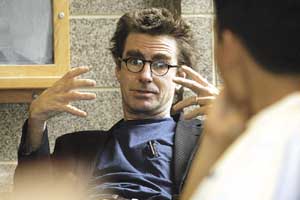2002 Quantrell Award Winner: Gary Herrigel, Associate Professor in Political Science and the College
By Josh SchonwaldNews Office
 Gary Herrigel |
Last quarter, for instance, a student told him that reading Clifford Geertz was “eye-opening,” and that Geertz’s theories forced him to think in new ways about how social life is formed. “It was rewarding to hear this,” said Herrigel.
But, Herrigel said, teaching his students how to form an argument is as important as teaching them about social and political theory. Teaching students how to argue means teaching them to appreciate the text, not only as a point of departure for a discussion, but also, he said, as a thing of structural beauty. “I want them to be able to read these texts and begin to appreciate the rigor and subtlety of an argument that’s in a text,” he said. “I want them, for instance, to see the brilliance and beauty of Locke’s Second Treatise.”
It is only after students can recognize and understand othersÝ arguments that Herrigel can begin to help them shape their own. This often is challenging, even with Chicago students, he said. So often, said Herrigel, students in high school are taught to be creative, but not analytical. “You have to get them to make arguments based on the resources in the texts they’re provided.”
He views his teaching style as that of a facilitator. During his own experiences as a studentˇas an undergraduate at Wesleyan University and a graduate student at the Massachusetts Institute of Technologyˇhe found that he learned most when he had to struggle for an answer.
“I egg them on,” said Herrigel of his role in class discussions. “I’ll intervene as an arbiter and will tell them why an argument is not strong, or I’ll tell them when an argument isn’t based on the resources provided.” But, he said, he does not want to play an overly expansive role in the classroom. Herrigel wants his students to grope their way toward a coherent interpretation of a text. “That’s my pedagogical strategy,” he said. “The goal is for them to achieve sovereignty as readers and thinkers.”
Though the content of his two classes in the Social Sciences Core, Culture and Power and Power and Politics, often comes from serious, sober texts, and the focus is on learning the rigor of argument, there is room for play, said Herrigel. “I try to make it fun. I try to make them feel comfortable to explore.”
Herrigel said he did not choose academia because of a desire to teach. “This is not a calling for me.” A scholar of European politics and political economy who has specialized in social theory and comparative political economy, Herrigel, like many academics, has nonetheless come to find teaching very rewarding.
“I’m not a missionary about it, but I feel strongly that teaching can be good for democracy. It can create educated citizens with the capacity to have calm, rational discussions, even when they have differing views.”
![[Chronicle]](/images/small-header.gif)